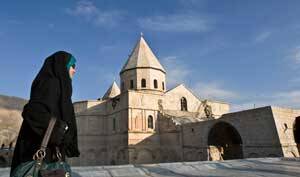Religious leaders met in Detroit, Lebanon and Rome in February to address the accelerating emigration of Christians from the Middle East, an exodus that seriously threatens the survival of Christianity in the region. Currently between 12 million and 15 million Christians reside in the Middle East, almost half of them in Egypt, and in most Middle Eastern countries less than 10 percent of the population is Christian. The Christian population in the Middle East has been in steady decline since the Young Turks Revolt in 1908 and the subsequent persecution of Christians. While persecution is still a contributing factor, most participants in the February meetings agreed that the causes of migration today are primarily social and political. Tarek Mitri, Lebanon’s minister of information, said Christians, who are among the better-educated classes, are “victims of their good education” in that they are able to provide a better standard of living for their families by emigrating to where there are better career opportunities. In this way, the increasing rate of migration is in part a consequence of globalization. “If a young Palestinian—Christian or Muslim—can get work in the United States or Dubai, then they will go,” said Bernard Sabella, a Catholic member of the Palestinian parliament and former professor at Bethlehem University.
Causes.
Archbishop Jean Sleiman of Baghdad said that while economic and political problems are the major reasons for leaving in most areas of the Middle East, Christians in countries like Iraq and the Palestinian territories leave out of “fear of Islamic fundamentalism and being legally discriminated against” in an Islamic state. In Iraq the problem is particularly acute: at least half of all Christians in Iraq, an area inhabited by Christians since the first century, have left that country in the last five years. The crisis has become so severe that the bishops of Iraq have called on Pope Benedict to convene an extraordinary regional synod to address the problem.
Consequences.
Another area of agreement that emerged from the meetings is that it is desirable for Christians to remain in the Middle East not simply because of their long history in the area or because they are lawful citizens. Archbishop Sleiman said Christians help preserve peaceful coexistence in religiously and ethnically diverse societies. Christians possess a unique culture that displays “the willingness to mediate,” and therefore they “could do so many things because reconstruction [of a war-torn nation] deals above all with souls, culture, mentalities,” the archbishop said.
Some participants in the meetings also said a strong Christian presence could help moderate Muslims to counter the rising wave of Islamic extremism sweeping the region. Mohammed Sammak, a political adviser to Lebanon’s grand mufti and a participant in the Rome meeting, said, “The fewer Christians there are, the more [Islamic] fundamentalism rises,” fills the void and gains the upper hand; “that is why as a Muslim, I am opposed” to Christians emigrating. For Christians to disappear from the Middle East would be like “pulling out the threads of a cloth so that the whole social fabric risks unraveling and dying.”
Another danger is that if Muslim-majority nations do nothing to protect and encourage their Christian minorities to stay, then Western countries will think that Islam does not accept or respect Christianity, Sammak said. If people living abroad see that Muslims are unable to live with Christians even when they share the same culture, language and citizenship, he said, “then they’ll think, ‘so how can we Europeans live with Muslims?’” Tensions and restrictions against Muslims living in or immigrating to Europe may be exacerbated as a result.
Syrian Orthodox Metropolitan Mar Gregorios Yohanna Ibrahim of Aleppo appealed to Muslim nations and authorities, telling them that their role is “to safeguard Christians. It is up to you. We don’t believe our protection can come from outside.”








